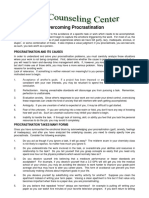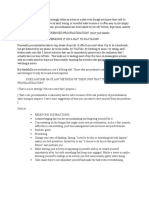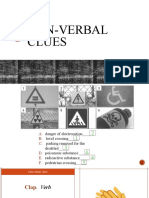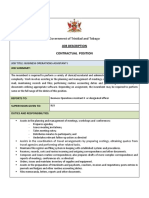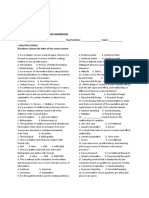Understanding Procrastination
Objective: To understand what procrastination is, why it happens, and identify personal
procrastination triggers.
Introduction (15 minutes)
1. Welcome and Introduction:
o The therapist greets the participant and introduces the session’s objectives:
understanding procrastination and identifying personal triggers.
o Explain the importance of this session as the foundation for overcoming
procrastination.
2. Definition of Procrastination:
o Procrastination is the act of delaying or postponing tasks despite knowing
there may be negative consequences.
o Differentiate between procrastination and purposeful delay, emphasizing that
procrastination often stems from negative emotions or avoidance.
3. Causes of Procrastination:
o Discuss common causes, such as:
▪ Lack of motivation
▪ Fear of failure or success
▪ Perfectionism
▪ Feeling overwhelmed or lack of clarity
▪ Poor time management skills
Activity: Self-Assessment Quiz (20 minutes)
1. Purpose:
o To help identify personal procrastination triggers.
2. Instructions:
o The therapist provides the participant with a self-assessment quiz with
questions about habits, thoughts, and feelings related to procrastination.
o Sample questions:
▪ Do you often find yourself doing trivial tasks instead of important
ones?
▪ How often do you delay starting tasks until the last minute?
▪ Do you frequently underestimate the time required to complete tasks?
▪ Do you often feel overwhelmed by the tasks you need to complete?
3. Completion:
o The participant completes the quiz individually.
4. Discussion:
o The therapist and participant review the results together, identifying key areas
and patterns.
�Discussion: Sharing Results and Patterns (20 minutes)
1. One-on-One Sharing:
o The participant shares their quiz results with the therapist.
o Discuss common patterns and triggers observed from the quiz.
2. Therapist’s Role:
o The therapist facilitates the discussion by highlighting common themes and
providing insights.
o Emphasize that recognizing these patterns is the first step toward change.
Exercise: Reflection on Personal Procrastination (15 minutes)
1. Instructions:
o The therapist asks the participant to reflect on a recent instance where they
procrastinated.
o Write about the task, why they procrastinated, and how it affected them.
o Encourage consideration of thoughts and feelings during this time.
2. Discussion:
o The therapist and participant discuss the reflection, focusing on insights and
any surprises encountered.
Homework: Procrastination Journal (5 minutes)
1. Purpose:
o Increase self-awareness of procrastination habits.
2. Instructions:
o The therapist instructs the participant to keep a journal for the next week,
noting each instance of procrastination.
o Include details such as the task, reasons for procrastinating, and feelings
associated with it.
o Reflect on any patterns or triggers identified.
Closing and Q&A (10 minutes)
1. Summary:
o Recap the key points discussed in the session.
2. Questions:
o Open the floor for any questions or clarifications from the participant.
3. Encouragement:
o Encourage the participant to be honest in their journals.
o Remind them that awareness is a crucial step in overcoming procrastination.
4. Preview Next Session:
o Briefly introduce the next session on the cost of procrastination.




































